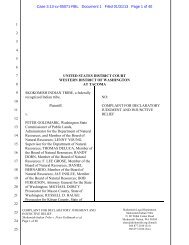Appellant Brief - Turtle Talk
Appellant Brief - Turtle Talk
Appellant Brief - Turtle Talk
You also want an ePaper? Increase the reach of your titles
YUMPU automatically turns print PDFs into web optimized ePapers that Google loves.
The Band’s position was made clear early on. On July 3, 1955, shortly after<br />
the formation of any right-of-way here, the Red Lake Tribal Council discussed a<br />
rumor. Its minutes state:<br />
Peter Graves said that there are rumors that the State Highway<br />
Officers are to patrol the State Highways on the reservation. He said<br />
that the Red Lake Band has not relinquished the land, and we are not<br />
under State law.<br />
Minutes of July 3, 1955, JA0219. Peter Graves was the Secretary of the Band at<br />
the time and signed the Tribal Council resolution consenting to a right-of-way.<br />
Tribal Council Resolution No. 2 (Apr. 21, 1955), JA0026. It is worth noting that<br />
there is no mention in that resolution of any assumption of jurisdiction by the<br />
State. 8 It is also clear from statute and the regulations that the BIA superintendent<br />
could not grant something that the Council had not consented to give. 25 U.S.C.<br />
§ 324; 25 C.F.R. § 256.3 (1951), JA0067. To this day, the Band acts consistently<br />
with the interpretation that any grants of right-of-way over Highways 89 and 1 do<br />
not convey governmental authority or jurisdiction to the State.<br />
8 The Tribal Council included a number of conditions in the Resolution that<br />
were not incorporated into the application or the purported approval by the<br />
superintendent. That fact alone is an infirmity in the approval process, since the<br />
conditions were not incorporated into a federal document binding on the State, as they<br />
should have been were the State assuming control over the roadbed. Of course,<br />
another interpretation–one that is far more consistent with the course of<br />
performance–is that the conditions were not incorporated elsewhere because the State<br />
continued, and still continues, to recognize the Council’s authority over lands<br />
underlying the “rights-of-way” on the Reservation.<br />
25

















